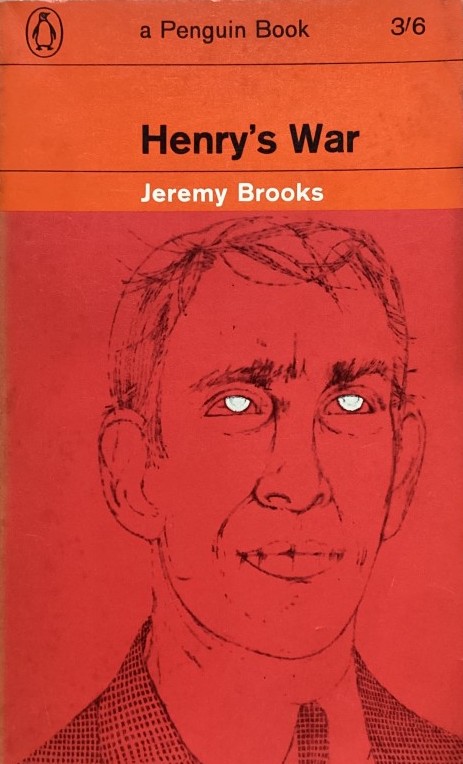Inspiring Older Readers
 posted on 29 May 2024
posted on 29 May 2024
Henry’s War by Jeremy Brooks
Who, you might reasonably be asking, was/is Jeremy Brooks? It’s fair to say that his name has slipped into literary limbo but in 1962 when Henry’s War was published, the critical response was overwhelmingly positive. Take, for example, this one quoted on the Wikipedia page dedicated to Jeremy Brooks:
‘….Isabel Quigley in The Sunday Telegraph, wrote: "The crashing of serio-comic novelists between two stools is a familiar sound to novel reviewers, since few funny novels with serious intentions manage to be either funny or serious enough. Many try to pull it off, for it looks so easy (think of the disarming simplicity of a book as deadly, deadpan and complex as 'A Handful of Dust' say). But few succeed. Among the few I would put Jeremy Brooks with his 'Smith, As Hero', sequel to the much-praised 'Jampot Smith'. It seems to me, though in a totally different style, quite as funny as the early Waugh, and with a flavour indescribably mixed, strong, attractive and alarming... ...It is part of Brooks’s extraordinary skill at mixing his levels of feeling, intensity and response that he can end this wildly comic novel with an appalling scene aboard a post-war immigrants' hell-ship to Palestine, and make it seem a part of all that has gone before. Smith has, by then, grown up a little."’
Brooks (1926-1994) was something of a jobbing literary man, primarily a novelist but with an interest in drama, television, radio, poetry and journalism. But he was very much a writer with a sensibility forged in the immediate post-Second World War world and with interests that other, better, novelists were able to take up, move forward and leave those like Brooks eclipsed and struggling for attention in their shadows.
It seems to me that Henry’s War is a very good example of why Brooks is very rarely namechecked today. Henry is a novelist who has a reasonably successful line in sub-Ian Fleming thrillers but he lives a life that, Walter Mitty-like, mixes his fictional world with the real one. The result is a novel that starts off with an atmosphere not unlike Kingsley Amis’s Lucky Jim or John Wain’s Hurry On Down but very soon finds itself being dragged into more political territory. Henry is engaged to Veronica – an evangelical Christian pacifist who bullies our hapless hero into participation in her campaigns, the latest of which is a protest against a British colonial incursion into the (fictional) Castillian Islands.
Although this relationship is mildly comic, it’s also hugely unlikely. But it is central to what follows. Henry finds himself falling for another girl – Bertie – something of a beatnick ingenue but his life really is turned upside down when he and his best friend, Charlie, are called-up as army reservists to fight in the Castillian crisis. The two of them decide it’s time to ‘disappear’ and head off back to their childhood native Wales to work on an isolated sheep farm where they hope they can ride out the call-up.
By this point the farce has been toned-down considerably and replaced by lengthy quasi-debates about pacifism, the nuclear threat, Communist expansion and patriotism.
The boundary line between the private and the political becomes the key theme of the book and the ultimately destructive nature of politics in the real-world washes over Henry like a wave – all he really wants is to settle down with his new love and continue to live in his fictional imagination. But he will be denied that by the brutality of reality.
This is not a lengthy novel and I think that is a strength but it’s impossible to avoid the feeling that the book is a bit of a jumble – pulled backwards and forwards by the influences of those other authors coming through to public acclaim. It ends up being an interesting read rather than an impressive one – but you may want to find out for yourself whether I’m being too harsh because clearly the critic from The Telegraph I noted above thinks it’s a much better book than I do.
I don’t think it’s currently in print but the Penguin paperback can be easily found on line and is cheap – but beware because you might find that, like mine, it’s prone to falling apart.
Terry Potter
May 2024